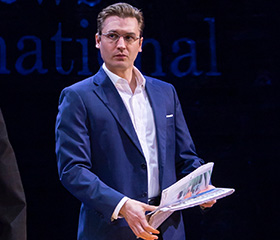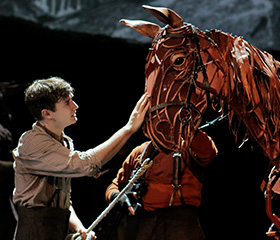In Corruption, Seth Numrich plays James Murdoch, the fourth child of media mogul Rupert Murdoch. “I had my own preconceptions about Rupert and the family business,” Numrich told me the other day, “but I didn’t know much about the children.” J.T. Rogers’ play gives us a thirtysomething James in London more than a decade ago, as he tries to assert his newfound authority as a senior executive within his father’s empire. Before rehearsals began, Numrich set out to discover what brought his character’s real-life counterpart to that moment.
“James felt the weight of family expectations from a young age,” the actor said, “and initially he found ways to rebel against them. He dropped out of Harvard in his third year to pursue creative endeavors.” Among them was the founding of Rawkus Records, specializing in hip-hop artists. After early success, the label foundered. It was bought by the Murdoch corporation, and, before long, James had joined the family firm. He earned his corporate stripes with postings throughout Asia before landing in London.
“James’s involvement with artists,” Numrich observed, “probably gave him an understanding of what creative people working for the Murdoch empire go through. As a young man, he’d exercised his artistic side. He’d drawn a comic strip for the Harvard Lampoon and he’d studied puppet animation. Since I’ve had some experience with puppets, I found that fascinating.”
Numrich was referring in part to War Horse, which had a hit run on LCT’s Vivian Beaumont stage, from 2011 to 2013, and in which he played the central role of Albert. I asked Numrich to compare himself at that point, when, a few years out of Juilliard, he landed such a plum role, to the person and performer who is playing James Murdoch.
“I’d had enough training before War Horse,” Numrich replied, “to have a certain amount of confidence in my abilities. But I was initially terrified. I thought that I would have to carry this huge production on my back and I was really afraid that I wouldn’t be up to it. The luxury of getting to do the play for so long with such a big, talented cast was eventually realizing that I wasn’t carrying anything. We were carrying it together. With Corruption, I have that communal sense even more profoundly.”
Why? Because since War Horse Numrich has had the good fortune to be part of several more sizeable ensembles, which, he points out, “are rare these days -- more and more theater companies can’t afford large casts.” He’s played the boxer-violinist in LCT’s staging of Clifford Odets’s Golden Boy, an English journalist on Broadway in Tom Stoppard’s Leopoldstadt, and, just before slithering into Murdoch’s skin, an Irish translator in an acclaimed off-Broadway production of Brian Friel’s Translations.
“I didn’t necessarily set out to have a career in large-cast productions,” Numrich confessed. “But I’m happy it’s turned out that way. It’s a relief when the load can be shared by so many people.” He added, “Learning from so many committed actors over the years has helped me work through the layers of doubt I had when I was younger. I’m more self-reliant now, and clearer about pursuing what really interests me.”
Epic productions, however, can be tricky. “When you’re working with a big group,” Numrich said, “there are more opinions that are involved and more perspectives that must be respected. And there’s also more chance for creative confusion. Once you start performing a big play it takes more time for it to settle down.” During the first week of previews for Corruption, Numrich said, “it was pretty hectic backstage. Now things are running smoothly, which is great given the breakneck nature of the drama.”
Corruption’s presto pace requires extremely agile actors. “It’s a challenge coming in and out for short bursts,” Numrich said. “Plus, none of the scenes last for long, which means they don’t have a run-up and a tail-off. You come in at a ten and come off at a ten.”
I point out that this tempo is the opposite of, say, that in Chekhov, whose Uncle Vanya will soon start performances in the Beaumont, just above the Corruption arena. Numrich responded, “With Chekhov, you have the luxury of living in the space. You’ll be playing cards for a while upstage and saying nothing and then you have a scene downstage where you’re saying a lot. But you’ve been there the whole time and you’re living in the story not waiting backstage.”
Biding time backstage, however, has its compensations. “You can listen to and observe your fellow actors,” Numrich said. “And with the Corruption cast, if you nail a scene people are good about letting you know. It’s a true ensemble.”
Brendan Lemon is a freelance journalist in New York.

